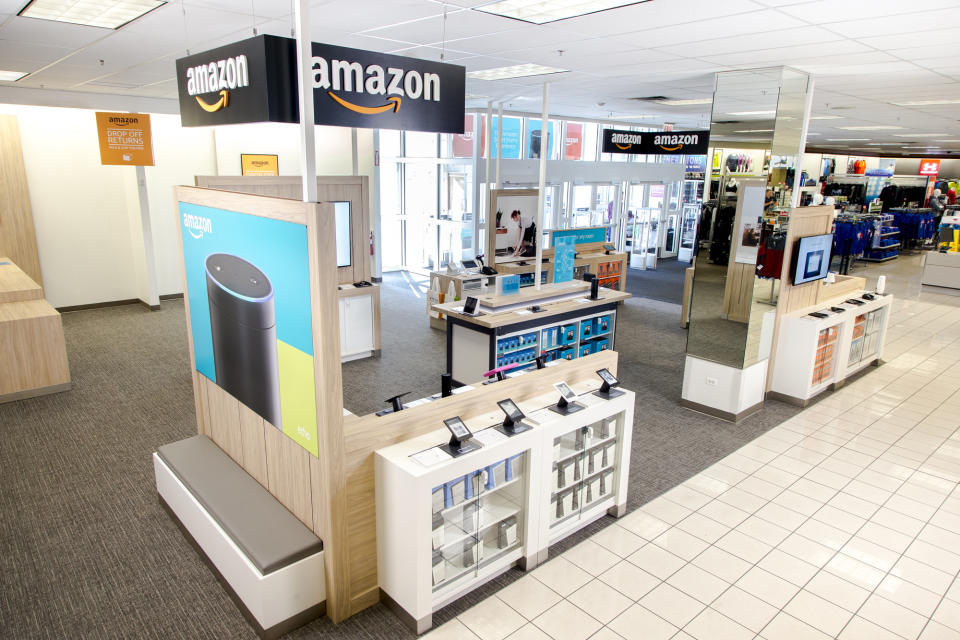Should Retailers Work With Amazon?
Amazon.com (NASDAQ: AMZN) has become so big that its rivals have a decision to make. They can work with the online giant -- a potential deal with the devil -- or they can elect to compete and risk being crushed.
Some brands have chosen to go it alone. Walmart (NYSE: WMT) and Target (NYSE: TGT) consider Amazon a direct competitor, a rival to fight at all costs. That's essentially the choice FedEx made when it chose to give up its deal with the online giant.
That's a bold move to make, and some retailers have chosen to do the opposite. Two notable ones -- Kohl's (NYSE: KSS) and Rite Aid (NYSE: RAD) -- have decided to embrace the competition. Essentially, they're betting that their deals with the online leader bring in more traffic than the companies lose through Amazon's general efforts to dominate.

Kohl's also sells Amazon products. Image source: Kohl's.
What are Kohl's and Rite Aid doing?
Both have similar deals, but for sort of reverse purposes. Kohl's accepts Amazon returns. That deal started as a small pilot program, and it expanded to all of the chain's roughly 1,150 locations in 48 states.
The Rite Aid deal solves a different problem. It lets customers pick up their deliveries at one of the pharmacy chain's locations. The deal will begin at 100 Rite Aid locations and may expand to the full chain. It's also part of a larger effort Amazon has dubbed Counter, which may eventually expand to other retailers.
Both of these programs solve pain points for Amazon customers. Returning packages can be frustrating, and Kohl's will help with packaging and labeling the returns.
The Rite Aid deal, and Counter in general, offers another option for Amazon customers who don't want their orders delivered at home. That helps anyone worried about having a package stolen or people who may be away when an order gets delivered.
It's easy to see what Amazon gets from these deals. The company gets to expand its physical presence without having to open more stores. That's a benefit for its customers.
The pluses are less clear for Rite Aid and Kohl's. In theory, customers who enter those chains to pick up or return packages could buy things. In reality, it's hard to know if someone returning a package is going to try on clothes or buy some bedding at Kohl's.
For Rite Aid, which sells a lot of impulse items, it might be easier to see how the chain could gain some incremental sales. Still, that may not be worth helping Amazon get stronger.
The devil you know?
If Kohl's, Rite Aid, and other retailers decided not to work with Amazon, the online giant might not be quite as strong. In reality, the online giant has enough money to build out whatever pickup/drop-off infrastructure it needs.
By not working with the online retailer, Kohl's and Rite Aid might slightly delay its plans, but it would not even mildly derail them. By choosing to play along, the two chains get a chance to benefit from Amazon's customers -- or at least has a chance to try to sell to them.
It seems unlikely that either chain will gain a lot of sales from accepting Amazon returns or deliveries respectively. Still, there seems to be very little reason to not try to make something from the deal.
More From The Motley Fool
John Mackey, CEO of Whole Foods Market, an Amazon subsidiary, is a member of The Motley Fool's board of directors. Daniel B. Kline has no position in any of the stocks mentioned. The Motley Fool owns shares of and recommends Amazon and FedEx. The Motley Fool has a disclosure policy.

 Yahoo Finance
Yahoo Finance 